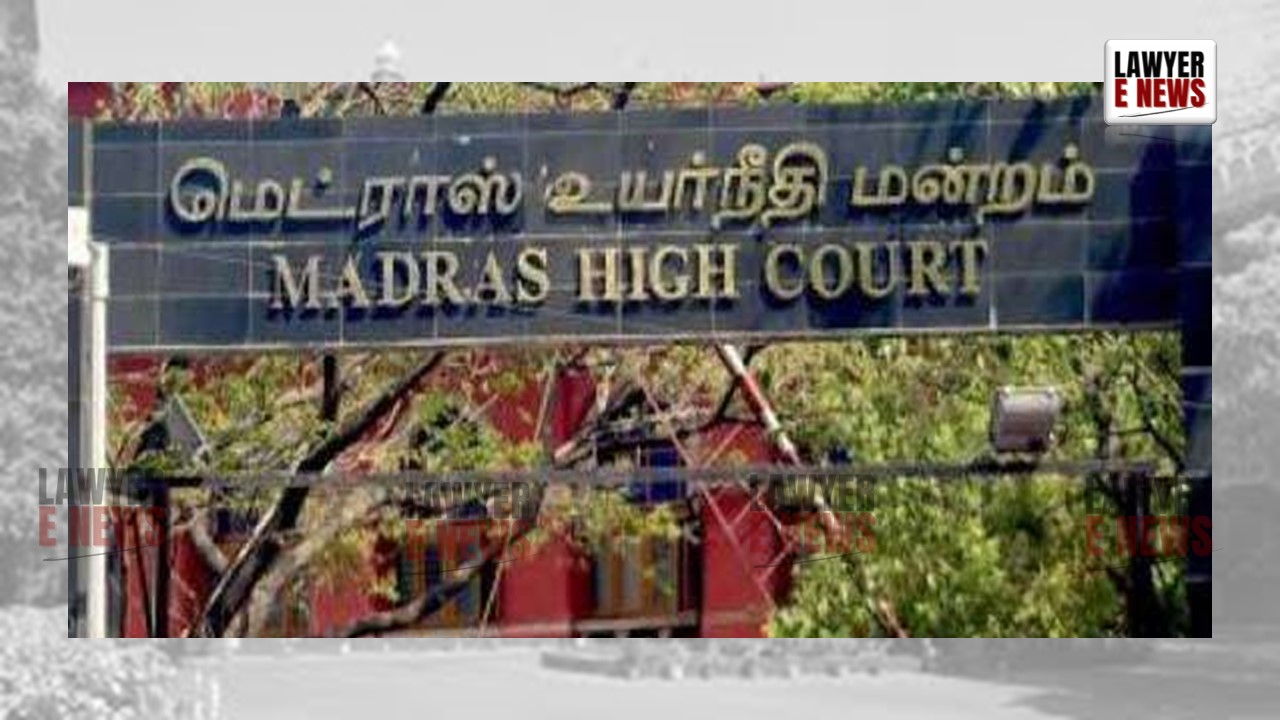-
by Admin
15 February 2026 5:35 AM



“Extension Granted Under Proviso to Section 28(9) is Legally Valid,” Holds by Madras High Court dismissed a writ appeal filed by Nalin Gupta, challenging the validity of adjudication proceedings under a show cause notice issued by the Commissioner of Customs, Chennai-II Commissionerate, dated September 28, 2022. The appellant argued that the proceedings were barred by limitation under Section 28(9) of the Customs Act, 1962. However, the Division Bench of Justice R. Suresh Kumar and Justice C. Saravanan upheld the extension of time granted by the Chief Commissioner of Customs on May 7, 2024, under the proviso to Section 28(9). The Court further directed a comprehensive vigilance probe into allegations of systemic lapses and complicity within the Customs Department.
“Extension Under Proviso to Section 28(9) is Legally Valid,” Holds Court
The main legal issue in the case revolved around whether the extension granted under Section 28(9) of the Customs Act, 1962, was valid. Under Section 28(9)(b), adjudication of a show cause notice must be concluded within one year, and an additional one-year extension can only be granted by a senior officer after the expiry of the initial period.
Analyzing the timeline, the Court observed that the show cause notice was issued on September 28, 2022, and the initial one-year period expired on September 27, 2023. The Chief Commissioner of Customs extended the limitation period on May 7, 2024, citing procedural delays. While the appellant argued that the extension was invalid and the proceedings had abated, the Court clarified the scope of the law, stating:
"The proper officer becomes functus officio after the expiry of the initial limitation period. It is only thereafter that any officer senior in rank to the proper officer is empowered to extend the time for adjudication by six months or one year under the first proviso to Section 28(9). The extension granted in this case on May 7, 2024, was within the framework of the law."
The Court ruled that the extension remained valid and directed the Customs Department to proceed with the adjudication proceedings.
“Time Before Courts Excluded From Limitation Calculation,” Rules Court
The appellant contended that, under the second proviso to Section 28(9), if proceedings are not concluded within the extended limitation period, the show cause notice is deemed to have abated. The appellant argued that no further proceedings could take place since the adjudication was not completed by the initial deadline.
The Court, however, clarified that the second proviso accounts for time spent before courts or other legal forums. It excluded the time taken during litigation, allowing the Customs Department to conclude the proceedings within the remaining time available. The Court held:
"Where the time prescribed under Section 28(9) is interrupted by proceedings before a court, the remaining period should be computed after excluding the time during which the matter was sub judice. The adjudicating officer is thus required to conclude the matter expeditiously within the time remaining after such exclusion."
The Court noted that cross-examination of witnesses, as directed earlier by the Customs, Excise, and Service Tax Appellate Tribunal (CESTAT), had been allowed on June 19, 2024, after delays attributable to both the Department and the appellant.
The Court expressed concern over significant procedural lapses by Customs officials in processing the adjudication. The delay in completing adjudication prompted disciplinary action against two subordinate officers, but the Court found these measures insufficient. It identified a potential pattern of fraud and complicity among senior officers to delay proceedings and grant undue advantage to the appellant.
"This case reflects a glaring failure within the Customs Department, where statutory safeguards were prevaricated and procedural timelines ignored. There appears to be large-scale complicity and subterfuge among officers at multiple levels, intended to allow the appellant to evade liability," the Court remarked.
The Court took serious note of the Deputy Commissioner of Customs (Adjudication), Chennai-III, passing an order on April 19, 2023, despite lacking jurisdiction to adjudicate the show cause notice. The Bench observed:
"The Deputy Commissioner acted without jurisdiction in rejecting the appellant’s request for cross-examination. This decision further derailed the proceedings, complicating adjudication unnecessarily. Any officer acting outside their statutory authority undermines the integrity of the process."
Acknowledging the disciplinary action already initiated against two subordinate officers, the Court noted the likelihood of involvement by senior officials and ordered a full-fledged vigilance inquiry. It directed the Customs Department to investigate all officers involved in the delays and to initiate disciplinary and anti-corruption proceedings where appropriate.
"Mere initiation of disciplinary proceedings against two subordinate officers is insufficient. The role of senior officers in orchestrating delays and prevaricating safeguards must be investigated thoroughly. A full probe is necessary to restore integrity within the Customs Department," the Court declared.
The Bench ordered the Principal Commissioner of Customs (Preventive), Chennai, to refer the entire file to the Vigilance Department and submit a status report within six months. It further directed that both disciplinary and anti-corruption proceedings be initiated against officers found complicit.
Requests for Cross-Examination Premature Without Reply, Rules Court
The Court also addressed procedural misuse by the appellant, who requested cross-examination of witnesses without submitting a reply to the show cause notice. It held:
"Cross-examination of witnesses should not be entertained without a reply on the merits of the case. Entertaining such requests prematurely leads to unnecessary delays and undermines the adjudicatory process."
The Court clarified that such requests should be filed only after the party has presented its defense on the substantive issues.
Dismissing the appeal, the Bench upheld the validity of the extended adjudication period and emphasized the importance of adhering to procedural safeguards under the Customs Act. The Court reiterated:
"The adjudication process under the Customs Act must uphold statutory timelines and ensure accountability among officers. The integrity of the system relies on the vigilance of its officers and the adherence to prescribed legal procedures."
Date of Decision: November 7, 2024
